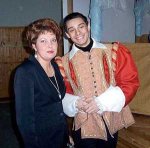 |

|

|
It all started with Marshal Stanisław Małachowski High School's volunteers who, together with Mrs. Renata Kutyło - Utzig, went to the Social Assistance House in Brwilno (a small village near Płock) to bring some fruit and sweets at Christmas time. The reaction of the youth was very strong. For the first time the young and healthy, generally well-off people saw so much of human misfortune at just one moment: mental disability was clearly visible just like physical one.
The theatre is the fruit of friendship between Mrs. Kutyło - Utzig and Mrs. Jolanta D±browska - the therapist from the Social Assistance House in Brwilno. Mrs. D±browska had tried to create mini-drama with the inmates but they were always dealing only with their own circle. In June 2001, both ladies came to the idea to try and establish the artistic cooperation between the two already befriended groups. The rehearsals started first in Brwilno, then in "Małachowianka".
The theatre made its debut with "Cinderella" based on the fairy tale by Jan Brzechwa, a famous Polish poet. The work on this project brought both joy and hard work. It took the inmates weeks to memorize each line; sometimes they forgot it and had to start from the very beginning. Getting the healthy and gifted students accustomed with the very slow pace of work was also a very laborious task. The enterprise succeeded and at the first nigh performance one could notice tears in the audience's eyes, who understood the huge effort of the actors. There was a lot of laugh as well thanks to humorous dialogues. The theatre attracted sympathizers and co-workers. The manager of Płock theatre, Marek Mokrowiecki gave his professional help. The music was, and still is composed by another artist from Płock theatre - Krzysztof Wierzbicki. The teachers of "Małachowianka" design and make the decorations and costumes, friends and inmates sew them, guests come to the first night with cake and fruit. The inmates are so close with "Małachowianka" that when they arrive, they immediately go to say hallo to the teachers and ask for a cup of coffee which they lake a lot. They talk with no embarrassment and enjoy the friendliness of the cleaning ladies, just like children.
In the second year of the cooperation, the next performance - "Sleeping Beauty" was prepared. It gave the actors even more joy and satisfaction. The play was very well received wherever presented.
In 2004 the theatre presented "Pinocchio", this time as the performance of theatrical gesture to enable the inmates to express themselves. It was a great satisfaction to present its first night during the international conference entitled "Does the different have to lonely?", which took place in "Małachowianka". The youth and their teachers from ten European countries were deeply touched - the "Pinocchio" performance presented a detailed picture of the emotions of the human who is rejected by the society of the pleased with themselves. |
© 2005 by Krzemin, Nagda, Ukash




